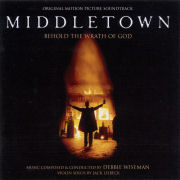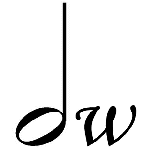Reviews – Middletown
 by Mike Beek, Music From The Movies
by Mike Beek, Music From The Movies
Welcome to Middletown, a bible-belt town that is slowly losing itself to the sins and pleasures of the 20th century, where drinking, gambling and smuggling are the order of the day. Enter Gabriel Hunter, one of the town’s sons, who has been away receiving religious instruction and told at a young age that he was ‘chosen by god…’ Gabriel takes it upon himself to save the town from the ills that modern society has slowly infected it with, confronting even his own family with a choice between God and the Devil.
Heavy stuff then from director Brian Kirk, along with a marvellous and ultimately inspiring performance by Matthew McFadyen in the lead role. Composer Debbie Wiseman reveals in the liner notes that it was his performance that inspired her initially, citing it as ‘extraordinary’.
Middletown is a score that relies heavily on mood, texture and a small clutch of thematic material that is explored and worked through throughout the twelve cues. As usual the composer has approached her work with much thought and intelligence, making pivotal choices about how the music will work in relation to the story. For example there are no woodwinds to be found here; the orchestra is made up of brass, strings and piano, the marriage of which creates a brooding intensity and an intended sense of claustrophobia in places.
Debbie’s strong main theme, introduced in the opening cue ‘One Of Our Own’, is a haunting, lonely melody for solo violin. Performed by young violinist Jack Liebeck, the instrument very much becomes Gabriel’s musical voice, solitary and impassioned. This theme is the root of the score and is returned to again and again, sometimes opened up with more strings (as in ‘Not As I Will, But As Thou Wilt’) and even piano (‘Our New Preacher’).
Another thematic line is begun in the second cue, ‘The Hour Is Coming’, which sees a relentless, driving refrain in the strings and piano. Atop this is the violin, which is zealous in its performance, mirroring Gabriel’s passion and almost maniacal devotion to his mission. Again this is a refrain that is returned to throughout the album, from ‘The Messenger of God’ through ‘I Bring You This Child’ and the finale cue, ‘Sinners and Blasphemers’. The latter track very much retraces the entire work, so certainly a contender for future compilation albums and lengthy at over seven minutes.
There are some moments where the heaviness lifts and the mood becomes perhaps slightly more reflective. These cues, notably ‘The Heart Of My Family’, see harp, strings and Liebeck’s consistently beautiful performance in a slightly higher register. ‘Chosen By God’ has a simple harp line accompanied by very rich strings and later joined by much higher register strings – and is a standout cue.
Other cues to highlight are ‘No Rest For The Wicked’, which introduces a meandering piano line and a short propulsive motif in the strings, and ‘An Infant Born In a Public House’ which sees another rambling piano line, this time cushioning yearning strings in what is quite an emotional piece.
Although there is a fair amount of repetition with regards to some of the motives and refrains on album, I believe this only serves to increase the intensity of the listening experience. Middletown is a first class effort; Debbie Wiseman has created a musical landscape that is filled with depth, emotion, pathos and much drama.
by Jonathan Jarry, Soundtrack.Net
Every once in a while, a score I’m listening to evokes a word, not a feeling. Such was the case with Middletown: its quiet string torments and urgent fiddle melodies kept whispering the word “pious” in my head. Even though the movie is about a fundamentalist priest returning from Africa to his small Irish town to start a cleansing that even his relatives can’t escape, there is nothing overly Catholic about the music (no church organs or choirs); but the rich textures of the writing itself evoke the strange combination of guilt, anguish, and felicity that Catholicism famously fosters. The chord progressions reminded me of Delerue’s Agnes of Godat times; there seems to be a select number of consonant groupings that excel at recalling the Catholic faith, and Debbie Wiseman certainly taps into that vein in her score to Middletown.
With this present score and Arsène Lupin, Wiseman shows that she is a composer who triumphs at everything that makes music good: melody, harmony, rhythm, dynamics, and orchestrations. I only mention those two soundtracks since these are the only ones I have heard from her; her résumé overflows with compositions that North American audiences might not be familiar with. I can only hope that an international “best of” release is in the works. Middletown opens with “One of Our Own”, introducing the Middletown Theme, a pious and human melody beautifully accented by quiet and rich harmonies that is built in such a way as to allow the composer to repeat it almost endlessly, as if the town itself had always stood and always would. It is given voice by a solo violin, the signature of this score, played with agony (as a conscious choice as opposed to a horrible performance) by Jack Liebeck, a British virtuoso barely in his mid-twenties. “The Hour Is Coming” rapidly announces a second theme, an urgent, descending melody accompanied by a string ostinato and a governing brass line. The trombones pick it up at the very end of the track, but the theme firmly belongs to the violin. Wiseman does not ask for a virtuosic performance out of Liebeck the way Corigliano did of Bell for The Red Violin; rather, the writing eschews toccatas in favor of held notes where the violinist is allowed to breathe emotions into the vibrations of the string. The full scope of the violin is used throughout the score, even if the upper range is clearly favored.
Wiseman shows a genuine gift for creating drama without becoming overbearing, preferring to carefully plot her harmonies instead of letting the violins and the brass scream their anguish. My only qualm with the score resides in its redundancy: the melodic material can become stale near the end, with the urgent theme given one too many repetitions. The last minute of the last track, “Sinners and Blasphemers”, kindly varies on the melody, allowing Liebeck to bridge the gaps with grace notes, in essence fleshing the theme out, and those variations would have been welcome throughout the score. As it stands, Debbie Wiseman’s Middletown is a nuanced and tormented score that rarely stalls thanks to subtle touches in dynamics and rhythm. Here is a composer who knows her craft intimately and who puts a lot of American film composers to shame. While Arsène Lupin had more verve and range, Middletown is content with excelling at the exploration of a more limited emotional baggage.
by Andrew Dowler, Now Magazine, Toronto
Cameraman Adam Suschitzky’s remarkable ability to create oppression from shafts of light, Debbie Wiseman’s score, which breathes evil with every note, and an effectively bleak and mud-soaked village in Northern Ireland help make the Reverend Gabriel Hunter a melodramatic villain so loathsome he’s almost Victorian.
The story is completely contemporary. It’s easy to see a metaphor for current religious conflicts when Gabriel returns to his boyhood village to take over the church, but, except for a brief opening quote, the focus stays on the smaller story. Gabriel sees sin everywhere, particularly in his brother, and he’s determined to clean house. There are deeper personal issues at work, and matters escalate to fine Gothic madness the night his brother’s wife gives birth.
Matthew Macfadyen, best known for his Darcy opposite Keira Knightley’s Elizabeth in Pride And Prejudice, does a fine job as Gabriel, and the rest of the cast turn in solid, professional work.
The extras are merely a page or two of professional bio and a credits list. But Macfadyen, the un-actory faces around him, the seldom-seen setting and great atmosphere make this a fun renter.

